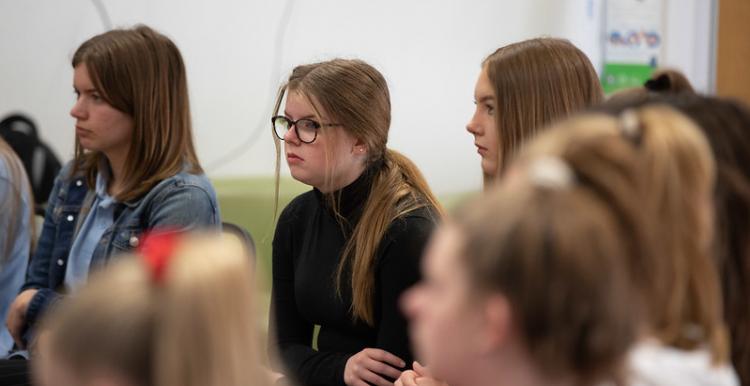Body Image

Information in this article has been taken from YoungMinds, Mental Health Foundation, Beat and Children's Society. - Revised 5th March 2021
Young volunteers from Youthwatch Darlington raise awareness
Earlier in 2020 young people across Darlington took part in our 'Children & Young People's Mental Health' survey. We asked them what every day life issues or event may affect mental health. Overwhelmingly body image was voted as the highest contributing factor.
At Healthwatch Darlington our young volunteers from Youthwatch Darlington wanted to raise awareness about body image and the affects this can have on mental wellbeing amongst younger people.
They have launched an awareness raising poster, gathered advice/information and shared their own experiences to raise awareness. This is to ensure young people know where to go for support.
They have also explored how body image may be particularly difficult to deal with at the moment due to the pandemic.
Join them in their mission to raise awareness by sharing their handy self help poster with young people living in the town.
Body image and mental health
Body image is about how you see yourself when you look in a mirror or when you picture yourself in your mind.
You may feel uncomfortable in your own skin, anxious, unhealthy or disempowered. Body image can have an impact on your self-esteem and confidence. The media can have an impact on what you think a ‘normal’ body should look like.
Top tips for a positive body image
- Keep a top-10 list of things you like about yourself: Things that are not related to how much you weigh or what you look like. Read your list often.
- Remind yourself that true beauty is not skin-deep: Look at yourself as a whole person; beauty is a state of mind and not a state of body.
- Surround yourself with positive people: It's easier to feel good about yourself and your body when you are around others who are supportive and who recognise the importance of liking yourself just as you are.
- Clothes: Wear clothes that are comfortable and make you feel good about your body.
- Body image, the media and social media: Be aware of images, slogans, or attitudes that make you feel bad about yourself or your body. Remember that images may have been edited by Photoshop.
- Do something nice for yourself: Do something that lets your body know you appreciate it. Take a bubble bath, make time for a nap or find a peaceful place outside to relax.
Tips if you are struggling with body image during the pandemic
YoungMinds share tips with young people who may be struggling with body image during the pandemic. Most of us have experienced big changes to our routine in lockdown, including changes to our diet and how much we move about or exercise. This may have an effect on our bodies and, potentially, our body image.
Top tips
- Give thanks for what your body does for you
- Practice body neutrality
- Exercise to feel good (not to punish your body)
- Give your body the nourishment it needs
- Find distractions
- Talk about how you are feeling
- Go easy on yourself
- Where to go for help
Body image and eating disorders
Eating disorders can be triggered by a number of factors and they’re different for every sufferer. Alex shared her story with Beat and said:
"I feel that the media is one of the most unhelpful influences and the mainstream representation of body image can be seriously damaging, particularly for young women. Magazines, adverts, billboards are constantly telling us that we need to look a certain way and imply that if we don’t match this ‘ideal’ body then we are the outsiders in society and need to change our ways to achieve the picture perfect body."
Body image and Lesbian, Gay, Bisexual and Transgender (LGBT) community
The Mental Health Foundation explored 'How body image may affect the LGBT community'.
They said:
"While people who identify as lesbian, gay, bisexual and transgender (LGBT) experience body image concerns in ways that are generally similar to people who identify as heterosexual, their experience and relationship with their body is likely to differ in specific ways."
Helplines, websites and further support
Young Minds
https://youngminds.org.uk/find-help/feelings-and-symptoms/body-image/
free, 24/7 crisis support across the UK if you are experiencing a mental health crisis - just text YM to 85258
Anorexia and Bulimia Care
- https://www.anorexiabulimiacare.org.uk
- If you're being affected by an eating disorder, you can ring the helpline.
- Helpline: 03000 11 12 13 (option 1: support line, option 2: family and friends
Beat Eating Disorders
- Run message boards which are available 24/7.
- Support groups run daily - for sufferers, as well as professionals and parents and carers
Carers Support Group - Teeside, County Durham and North Yorkshire
- https://helpfinder.beateatingdisorders.org.uk/eating-disorders-carers-group-for-teeside-co-durham-and-north-yorkshire
- A friendly, supportive group of carers who share as much or as little as they want with the group. The facilitators have first hand experience of caring for someone with an eating disorder and the heartache, frustration and worry which go hand in hand with that. They are supported by a health professional adult eating disorders specialist.
- The group meets the 3rd Tuesday of every month 5.30pm - 7pm.
- There is also an additional group on the 4th Wednesday of each month at West Park Hospital, Darlington DL22DS. For further information about the group, please contact Colin: colin.forth@nhs.net
Adult Eating Disorder Support Group
- This group runs from Crook in County Durham every Wednesday night from 7pm - 9pm.
- A support group for anyone suffering from any type of eating disorder.
- All will be welcomed and supported.
- This is a spiritual (non-religious) support group using the curriculum from ‘A Course in Miracles’.
- A Course In Miracles is a unique, universal, self-study curriculum that creates a spiritual transformation through the awareness of love’s presence. For full details about ACIM please go to: www.acim.org
- Contact: Jntmelody@gmail.com
TEDS
- A weekly peer support group for those affected by eating disorders, disordered eating or body image concern. Whether you are diagnosed or just feel that your eating habits aren't quite right sometimes, then please come along to meet people who understand and relax in a friendly and non judgemental environment.
- This groups takes place on Fridays, every week from 2-3pm.
- Referrals from health and social care professionals welcome.
- Please email or contact by telephone.
- Self refer by completing form on website or email/DM on social media - 07852419883
- Pop along and register in person.
Youth Access
A place for you to get advice and information about counselling in the UK, if you're aged 12-25.
The Mix
- www.themix.org.uk
- If you're under 25 you can talk to The Mix for free on the phone, by email or on their webchat. You can also use their phone counselling service, or get more information on support services you might need.
- Freephone: 0808 808 4994 (1pm - 11pm daily)
Be Real Campaign
https://www.berealcampaign.co.uk
The Be Real Campaign is determined to change attitudes to body image and help all of us put health above appearance and be confident in our bodies. It is a national movement made up of individuals, schools, businesses, charities and public bodies.
How to Improve your own Body Image
https://www.nationaleatingdisorders.org/learn/general-information/ten-steps
https://www.nationaleatingdisorders.org/learn/general-information/recovery
How to Support Someone with Body Image Issues
https://www.eatingdisorderhope.com/blog/encourage-partner-poor-body-image
https://www.supportiv.com/how-to-help/support-someone-with-body-image-issues
https://blogs.psychcentral.com/weightless/2010/09/9-ways-to-help-others-improve-their-body-image/
https://www.mentalhealth.org.uk/publications/body-image-report/protect-body-image
